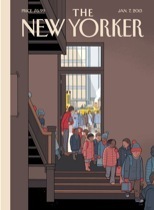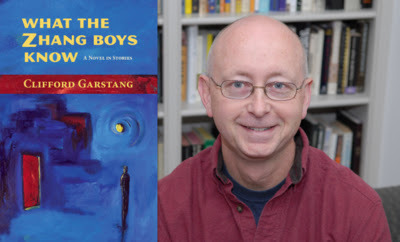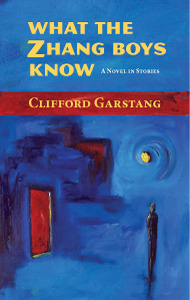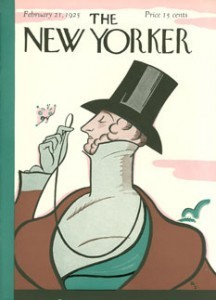Clifford Garstang's Blog, page 89
January 7, 2013
The New Yorker: “The Women” by William Trevor
 January 14, 2013: “The Women” by William Trevor
January 14, 2013: “The Women” by William Trevor
If you are the one person on the planet who has not read a story or seen a movie or television program about an unwed mother who has given her child up for adoption and then later sought out the grown child, you might find this story by the great William Trevor appealing. Otherwise, I’d be very surprised if you do.
The story’s behind the paywall, so here’s the gist: Cecilia grows up in the home of her father, her mother long gone. She is tutored at home and has no friends. She’s bored, and eventually the father sends her off to boarding school. It seems like a perfectly good school and she makes some friends, and on weekends her father comes down to visit. But there are these two older women who hang around, watching, and Cecilia finds them dumpy and odd. (The reader, on the other hand, is reasonably sure that one of the women is Cecilia’s mother.) We take a spin through the points of view of the women, learn that, in fact, one of them gave a child up, and eventually the other woman reveals that to Cecilia. Cecilia tells some of this to her father when they go away on holiday, and he apologizes for not telling Cecilia the truth, which appears to be that he acquired a child as a way to salvage a crumbling marriage but it didn’t work. Things could be worse. The End.
William Trevor is one of our greatest short story writers, but this one seems to have been written in his sleep.
January 6, 2013
The New Yorker: “The Lost Order” by Rivka Galchen
 January 7, 2013: “The Lost Order” by Rivka Galchen
January 7, 2013: “The Lost Order” by Rivka Galchen
Read the Q&A with Rivka Galchen to understand the “seed” of this story, although that’s not particularly necessary in order to understand the story itself (which, by the way, is NOT behind the paywall, so you can go read it now, if you haven’t already).
We begin with a funny, tone-setting first line: “I was at home, not making spaghetti.” What a great way to establish this narrator’s voice and to begin to define her. And then by trying to explain why “not making spaghetti” is significant, she devolves into a wonderful digression about being unemployed, trying eat less, because . . . and then her digressive train of thought is interrupted by a phone call. The caller I.D. says “unavailable” and she usually doesn’t answer such calls—I can relate—but on a whim she answers this one. I can relate to this, too.
The call is hilarious. It’s obviously a wrong number as the caller launches into his order for delivery, garlic chicken, etc., and the narrator promises delivery in 30 minutes. Which shows pretty clearly, if the opening digression hadn’t made the point, that this narrator is coming unglued.
She digresses some more and rambles, and there’s another call. The reader and the narrator both assume it’s the previous caller, but it’s not. It’s her husband. Husband? It’s something of a surprise that she has a husband, just as it’s going to be a surprise that we find out the career that she’s unemployed from is that of environmental lawyer. The husband wants her to go look for his lost wedding ring—uh-oh, is there trouble in the marriage?—but she doesn’t want to go look, and, funnily enough, he suggests that she go and “not look for it.” He may realize that she’s good at this. And his tone suggests that he realizes how close to losing it this woman is, so she’s temporarily mollified.
This time when the phone rings it’s the guy who placed the garlic chicken order, but she still doesn’t tell him he has the wrong number. Instead, she hangs up and goes to look for the ring, which the husband thinks he lost in a nearby park. She doesn’t find it, but she does have a day-long digression. When she returns home, the husband gently confronts her about the secret she’s been hiding and discloses that he’s found 3 severance checks for her. (She had claimed she quit her job.) And he points out what we already know—that she’s lost it and is just drifting.
And the story comes to an end, with her wondering.
Satisfying? Not really. Is she drifting because she was unhappy at work and so quit or got fired? Is she drifting because the world is full of mis-directed telephone calls? Not clear to me. You?
January 1, 2013
The New Yorker Story of the Year for 2012: “Breatharians” by Callan Wink
 The votes are in and it wasn’t even close! The award for The New Yorker Story of the Year for 2012 goes to “Breatharians” by Callan Wink.
The votes are in and it wasn’t even close! The award for The New Yorker Story of the Year for 2012 goes to “Breatharians” by Callan Wink.
The story was a little controversial because of its depiction of some very realistic animal cruelty, but there’s no question that it was memorable. For our discussion here, see: Breatharians by Callan Wink. To read the story in the magazine, go here. (The story is behind a paywall.)
To see a complete list of the finalists, go here.
Congratulations to Callan Wink!
December 30, 2012
Year of the Small Press?
 All you hear about these days, it seems, is “Indie Publishing” (a term which has been co-opted by self-publishers). And there’s a thoughtful article about this phenomenon in the Huffington Post recently: The Year Indies Finally Got on Top.
All you hear about these days, it seems, is “Indie Publishing” (a term which has been co-opted by self-publishers). And there’s a thoughtful article about this phenomenon in the Huffington Post recently: The Year Indies Finally Got on Top.
I certainly agree that there have been some successful self-published books recently, and that the ease of self-publishing opens doors to those who want to see their work in print. It’s really a wonderful thing for writers who either don’t have the patience or the desire to pursue traditional publishing or who find the doors to the traditional publishers closed to them.
But I still have some problems with the concept. First, the term “Indie Publishing” has been adopted by self-publishers as a way of de-stigmatizing what they do. Until the self-publishers got hold of it, the term was used to refer to independent university and small presses, i.e., traditional publishers outside of the very insular world of of the Big Six (now Five) trade publishers. Self-publishers claim they are merely following the lead of the music industry, and the point is now more or less moot as their usage of the term spreads, but there is a world of difference between the new Indie Publishing and the small presses.
To start with there is quality. Sure, I’ve read work from traditional publishers that isn’t great (or at least not to my taste, which is a different matter), and I’ve found errors from time to time that I wouldn’t let my college freshman composition students get away with. And there are some very good writers who have opted for legitimate reasons to self-publish (in order to make a larger share of the profits, for example, or simply to capitalize on their names). But in general there’s a real quality problem in self-publishing. Editors really do serve a purpose, and most self-published books are also self-edited, which allows errors to slip by.
But it’s not just about punctuation, spelling, and grammar. Marketing and best-seller lists aside, the reason some books succeed (earning critical acclaim or prizes) is that they’re well written. Readers still care about that, don’t they? (I certainly do, and so do most writers I know, but I suspect that I over-estimate the standards of the typical reader.) While there will probably be an increasing number of well-written, well-edited self-published books, I believe those are currently a very small minority. And how does the reader who cares know if the book she’s picking up is well written or not? You can read a sample, sometimes, but that may not be definitive. My rule of thumb? Unless I know the author or a particular book has been recommended to me by someone I know and whose taste and judgment I trust, I’m not going to read a self-published book. I may download it when the author makes it free for Kindle on Amazon, but it’s unlikely that I’ll ever actually read it. Life is too short, and I’ve got thousands of very good books I want to read.
Which brings me to small presses. I think the gatekeepers really do serve a purpose, although in recent years the gate has moved. Big publishers and the agents who serve them (there are agents who actually serve their clients, the authors, but those are increasingly hard to find) are looking for bestsellers. It’s a business, so I can’t really blame them for that. But these days there is a second “gate” that is available to more of us, those who write literary fiction that is unlikely to appeal to the big publishers. (Or maybe it isn’t our work that is the problem; women have long argued that the publishing world discriminates against them, and I would suggest that women aren’t the only victims of that discrimination–but that’s a whole other conversation.) This second gate is the small press, or what used to be called the Independent Press world.
Small press books have recently been recognized with major awards including the Pulitzer Prize and the National Book Award. Small press books are available in bookstores and through traditional distribution channels as well as directly from the publishers and, of course, through Amazon.com. Small press books may not have the broad appeal that the big publishers hope will lead to best-seller lists. Press 53, for example, which publishes both of my books, specializes in short story collections and poetry, both niche markets. But they’ve published some very fine work in both genres, and are making a name for themselves and their authors.
I am now trying to find an agent and/or publisher for a novel that I recently completed. I have confidence in the work, but I’m losing hope that big publishers will be interested. I thought they would be when I finished it, but at this point, I don’t think it will happen. And that’s really okay. There are hundreds of fine small presses out there. I’ve gone that route with my story collections. I can do it again with this novel. The trick is finding the right one. That’s my challenge in the coming year.
And I won’t say “never,” but I have no intention of self-publishing this book.
December 26, 2012
Do you have a question for the author about WHAT THE ZHANG BOYS KNOW?
 You’ve seen those “questions for discussion” at the back of some books, right? They may be frequently asked questions from readers or they might be designed by the publisher to stimulate discussion in book clubs. I know that some readers find them helpful and interesting. My book does not include discussion questions, but I plan to create a page here devoted to such questions.
You’ve seen those “questions for discussion” at the back of some books, right? They may be frequently asked questions from readers or they might be designed by the publisher to stimulate discussion in book clubs. I know that some readers find them helpful and interesting. My book does not include discussion questions, but I plan to create a page here devoted to such questions.
So, if you’ve read my work and have a question about it, or even if you have not read my work and are curious, post the question below (or send it by email via the Contact page). I’ll be gathering questions over the next couple of weeks and will post the results.
December 25, 2012
Merry Christmas — Around the World
 Afrikaans: Geseënde Kersfees
Afrikaans: Geseënde Kersfees
Afrikander: Een Plesierige Kerfees
African/ Eritrean/ Tigrinja: Rehus-Beal-Ledeats
Albanian:Gezur Krislinjden
Arabic: Milad Majid
Argentine: Feliz Navidad
Armenian: Shenoraavor Nor Dari yev Pari Gaghand
Azeri: Tezze Iliniz Yahsi Olsun
Bahasa Malaysia: Selamat Hari Natal
Basque: Zorionak eta Urte Berri On!
Bengali: Shuvo Naba Barsha
Bohemian: Vesele Vanoce
Bosnian: (BOSANSKI) Cestit Bozic i Sretna Nova godina
Brazilian: Feliz Natal
Breton: Nedeleg laouen na bloavezh mat
Bulgarian: Tchestita Koleda; Tchestito Rojdestvo Hristovo
Catalan: Bon Nadal i un Bon Any Nou!
Chile: Feliz Navidad
Chinese: (Cantonese) Gun Tso Sun Tan’Gung Haw Sun
Chinese: (Mandarin) Sheng Dan Kuai Le
Choctaw: Yukpa, Nitak Hollo Chito
Columbia: Feliz Navidad y Próspero Año Nuevo
Cornish: Nadelik looan na looan blethen noweth
Corsian: Pace e salute
Crazanian: Rot Yikji Dol La Roo
Cree: Mitho Makosi Kesikansi
Croatian: Sretan Bozic
Czech: Prejeme Vam Vesele Vanoce a stastny Novy Rok
Danish: Glædelig Jul
Duri: Christmas-e- Shoma Mobarak
Dutch: Vrolijk Kerstfeest en een Gelukkig Nieuwjaar! or Zalig Kerstfeast
English: Merry Christmas
Eskimo: (inupik) Jutdlime pivdluarit ukiortame pivdluaritlo!
Esperanto: Gajan Kristnaskon
Estonian: Rõõmsaid Jõulupühi
Ethiopian: (Amharic) Melkin Yelidet Beaal
Faeroese: Gledhilig jol og eydnurikt nyggjar!
Farsi: Cristmas-e-shoma mobarak bashad
Finnish: Hyvaa joulua
Flemish: Zalig Kerstfeest en Gelukkig nieuw jaar
French: Joyeux Noel
Frisian: Noflike Krystdagen en in protte Lok en Seine yn it Nije Jier!
Galician: Bo Nada
Gaelic: Nollaig chridheil agus Bliadhna mhath ùr!
German: Fröhliche Weihnachten
Greek: Kala Christouyenna!
Haiti: (Creole) Jwaye Nowel or to Jesus Edo Bri’cho o Rish D’Shato Brichto
Hausa: Barka da Kirsimatikuma Barka da Sabuwar Shekara!
Hawaiian: Mele Kalikimaka
Hebrew: Mo’adim Lesimkha. Chena tova
Hindi: Shub Naya Baras (good New Year not Merry Christmas)
Hungarian: Boldog Karácsonyt
Icelandic: Gledileg Jol
Indonesian: Selamat Hari Natal
Iraqi: Idah Saidan Wa Sanah Jadidah
Irish: Nollaig Shona Dhuit, or Nodlaig mhaith chugnat
Iroquois: Ojenyunyat Sungwiyadeson honungradon nagwutut. Ojenyunyat osrasay.
Italian: Buone Feste Natalizie
Japanese: Shinnen omedeto. Kurisumasu Omedeto
Jiberish: Mithag Crithagsigathmithags
Korean: Sung Tan Chuk Ha
Kurdish: Serî sallî nwê pîroz
Lao: souksan van Christmas
Latin: Natale hilare et Annum Faustum!
Latvian: Prieci’gus Ziemsve’tkus un Laimi’gu Jauno Gadu!
Lausitzian:Wjesole hody a strowe nowe leto
Lettish: Priecigus Ziemassvetkus
Lithuanian: Linksmu Kaledu
Low Saxon: Heughliche Winachten un ‘n moi Nijaar
Luxembourgish: Schèine Chreschtdaag an e gudde Rutsch
Macedonian: Sreken Bozhik
Maltese: IL-Milied It-tajjeb
Manx: Nollick ghennal as blein vie noa
Maori: Meri Kirihimete
Marathi: Shub Naya Varsh (good New Year not Merry Christmas)
Navajo: Merry Keshmish
Norwegian: God Jul, or Gledelig Jul
Occitan: Pulit nadal e bona annado
Papiamento: Bon Pasco
Papua New Guinea: Bikpela hamamas blong dispela Krismas na Nupela yia i go long yu
Pennsylvania German: En frehlicher Grischtdaag un en hallich Nei Yaahr!
Peru: Feliz Navidad y un Venturoso Año Nuevo
Philippines: Maligayang Pasko!
Polish: Wesolych Swiat Bozego Narodzenia or Boze Narodzenie
Portuguese:Feliz Natal
Pushto: Christmas Aao Ne-way Kaal Mo Mobarak Sha
Rapa-Nui (Easter Island): Mata-Ki-Te-Rangi. Te-Pito-O-Te-Henua
Rhetian: Bellas festas da nadal e bun onn
Romanche: (sursilvan dialect): Legreivlas fiastas da Nadal e bien niev onn!
Rumanian: Sarbatori vesele or Craciun fericit
Russian: Pozdrevlyayu s prazdnikom Rozhdestva is Novim Godom
Sami: Buorrit Juovllat
Samoan: La Maunia Le Kilisimasi Ma Le Tausaga Fou
Sardinian: Bonu nadale e prosperu annu nou
Scots Gaelic: Nollaig Chridheil dhuibh
Serbian: Hristos se rodi.
Singhalese: Subha nath thalak Vewa. Subha Aluth Awrudhak Vewa
Slovak: Vesele Vianoce. A stastlivy Novy Rok
Slovene: Vesele Bozicne Praznike Srecno Novo Leto or Vesel Bozic in srecno Novo leto
Spanish: Feliz Navidad
Swedish: God Jul and (Och) Ett Gott Nytt År
Tagalog: Maligayamg Pasko. Masaganang Bagong Taon
Tamil: (Tamizh) Nathar Puthu Varuda Valthukkal (good New Year not Merry Christmas)
Trukeese: (Micronesian) Neekiriisimas annim oo iyer seefe feyiyeech!
Thai: Sawadee Pee Mai or souksan wan Christmas
Turkish: Noeliniz Ve Yeni Yiliniz Kutlu Olsun
Ukrainian: Z Rizdvom Khrystovym or S rozhdestvom Kristovym
Urdu: Naya Saal Mubarak Ho (good New Year not Merry Christmas)
Vietnamese: Chuc Mung Giang Sinh
Welsh: Nadolig Llawen
Yoruba: E ku odun, e ku iye’dun!
December 21, 2012
Happy Winter Solstice!
 As I like to say, Freezin’ is the Reason for the Season!
As I like to say, Freezin’ is the Reason for the Season!
Happy Winter Solstice! Today, December 21 (at 6:12 AM in the Eastern United States) is the solstice, marking the sun’s southern most position in the sky, making this the shortest day of the year.
It’s well known that many rituals and symbols now used in the celebration of Christmas were adopted from pagan celebrations of the solstice.
So: Happy Solstice!
December 18, 2012
Kind words for the Zhang Boys
 It’s hard to get people to pay much attention to a small press book, so when they do and have good things to say about the book, it’s especially nice.
It’s hard to get people to pay much attention to a small press book, so when they do and have good things to say about the book, it’s especially nice.
Carol Fisher Saller, who is an assistant managing editor at the University of Chicago Press and an author herself, was kind enough to include What the Zhang Boys Know as her selection in the Press’s Staff Picks for Best of 2012. Please take a look at what she had to say, here.
Vote for The New Yorker Short Story of the Year — 2012
The nominations for New Yorker Story of the Year are now closed. The finalists (with links to the discussions on this blog) are posted below, with the ballot included at the bottom of the page.
A few things to note about the finalists:
I left out some fictions that I really liked, such as Colum McCann’s “Transatlantic” because they were excerpts from novels and I like to keep this a short story contest.
Of the ten finalists, only three of the stories are by women. I liked the Zadie Smith fiction, but again that was an excerpt. I didn’t much care for the Alice Munro stories or the Tessa Hadley or the Alice McDermott or the Rivka Galchen or the Lorrie Moore. No one nominated these stories and I didn’t feel they belonged in the group of finalists.
The finalists:
Means of Suppressing Demonstrations by Shani Boianju
Birnam Wood by T. Coraghessan Boyle
Citizen Conn by Michael Chabon
The Cheater’s Guide to Love by Junot Diaz
The Proxy Marriage by Maile Meloy
Chapter Two by Antonya Nelson
The Semplica-Girl Diaries by George Saunders
A Brief Encounter with the Enemy by Said Sayrafiezadeh
Sweet Dreams by Peter Stamm
Breatharians by Callan Wink
VOTE!
Take Our Poll
December 17, 2012
The New Yorker: “Shirley Temple Three” by Thomas Pierce
 December 24 & 31, 2012: “Shirley Temple Three” by Thomas Pierce
December 24 & 31, 2012: “Shirley Temple Three” by Thomas Pierce
I gather that Thomas Pierce is a student in the MFA program at the University of Virginia, not far from where I live. Which is neither here nor there, except that it’s quite an accomplishment to have a story in the New Yorker while still a student.
And quite a story it is, too. (It’s not behind the paywall, so you can read it for free, and while you’re there check out the Q&A with Thomas Pierce for a little background on the story.)
Here are the basics: Tommy works in Atlanta on a TV program called “Back from Extinction” on which extinct animals are brought back to life through cloning. Which is how he happens to be in a possession of a dwarf mammoth that he brings home for safekeeping at his mother’s (Mawmaw) place. He promptly disappears and Mawmaw is left to figure out how to care for the animal, which Tommy had named Shirley Temple. When Shirley gets sick, Mawmaw calls the vet, then the pastor, but nothing seems to work.
The situation is interesting and I love the characters, but because I found the ending to be unsatisfying I was really hoping the story was an excerpt from a novel. But apparently not. Tommy is a handsome, unreliable man–apparently he takes after his father, who was married to another woman and so could not marry Mawmaw–who doesn’t seem too bright. Mawmaw, though, is a survivor, and seems to genuinely care for poor old Shirley.
Read the story. What did you think of the ending?




